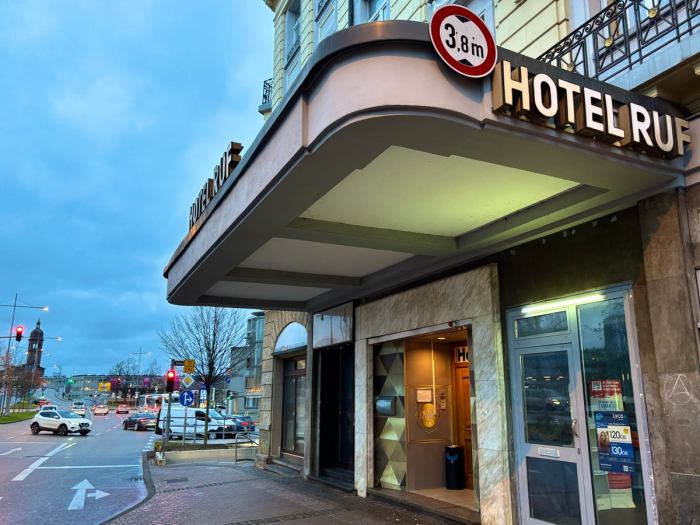How To Get The Best Hotel Room Without Paying Extra
How to Get the Best Hotel Room Without Paying Extra is a quest that many travelers embark on, eager to uncover the secrets of snagging the perfect stay without breaking the bank. Whether you’re planning a weekend getaway or a month-long adventure, understanding hotel pricing strategies and booking tips can make all the difference. In today’s competitive travel market, knowing how to leverage loyalty programs, communicate effectively with hotel staff, and utilize online resources can elevate your experience while keeping your budget intact.
From deciphering peak travel seasons to discovering the power of last-minute deals, this guide aims to empower you with essential knowledge that transforms your hotel booking experience into one of savvy savings and delightful surprises.
Understanding Hotel Room Pricing Strategies
Hotel pricing strategies form the backbone of how accommodations attract customers while maximizing their revenue. Understanding these strategies can empower travelers to secure the best possible room without incurring extra costs. Each hotel employs unique methods to set their prices, influenced by various factors such as demand, seasonality, and booking channels.Hotels often adopt several common pricing strategies to determine their room rates.
These strategies include dynamic pricing, where rates fluctuate based on real-time supply and demand; value-based pricing, which sets prices according to perceived value; and promotional pricing, which offers discounts during specific periods to attract guests. Factors such as market competition, hotel location, and room type also play significant roles in determining prices at any given time.
Factors Influencing Hotel Prices
Understanding the elements that influence hotel pricing is essential for making informed booking decisions. Several key factors include:
- Time of Booking: The timing of a booking can significantly impact pricing. Typically, booking well in advance or at the last minute can yield better deals.
- Market Demand: High demand periods, such as holidays and major events, often see increased pricing due to limited availability.
- Room Type: The choice of room can affect pricing, with suites and luxury accommodations generally priced higher than standard rooms.
- Location: Hotels situated in prime tourist areas or city centers may charge more than those located further away from main attractions.
Hotels also consider peak and off-peak seasons when setting rates. Peak seasons are typically characterized by high travel activity, leading to increased prices, while off-peak seasons often feature lower rates and promotional offers to entice guests.
Peak and Off-Peak Seasons
Recognizing the impact of seasons on hotel pricing can help travelers plan their trips more effectively. During peak seasons, such as summer vacations or holiday periods, room rates can soar due to heightened demand. Hotels often implement strategies like minimum stay requirements and non-refundable rates to protect their revenue.Conversely, off-peak seasons present an opportunity for travelers to secure significantly lower rates and promotions.
Many hotels offer incentives like complimentary breakfast or room upgrades as a means to attract guests during these quieter times.
“Travelers can save substantially by choosing to book during off-peak times, as hotels adjust their pricing strategies to maintain occupancy.”
Ultimately, understanding these pricing strategies and seasonal influences allows travelers to maximize their savings while enjoying the best possible accommodations during their travels.
Tips for Booking the Best Hotel Room Deals

Source: zenfs.com
When it comes to securing the best hotel room deals, a strategic approach can make a significant difference. By understanding various booking methods and leveraging technology, travelers can not only save money but also enhance their overall experience. This section will explore effective strategies for comparing prices, utilizing alerts, and the benefits of both advance and last-minute bookings.
Methods for Comparing Hotel Room Prices Across Multiple Platforms
Finding the best hotel room deal often requires a bit of research. Comparing prices across multiple platforms ensures you access the widest range of options. Consider the following methods:
- Use Aggregator Websites: Sites like Kayak, Trivago, and Google Hotels compile listings from various sources, allowing you to see prices from numerous hotels at once. This saves time and offers a broad view of available options.
- Check Hotel Websites Directly: Sometimes, hotels offer exclusive deals on their official sites that aren’t available on third-party platforms. Always compare these rates as they might include perks like free breakfast or Wi-Fi.
- Utilize Apps: Mobile apps like HotelTonight and Booking.com often have exclusive mobile-only rates. Download several apps and compare prices in real-time.
- Membership Discounts: If you are a member of organizations like AAA or AARP, check for member-exclusive discounts on various travel sites.
Importance of Using Price Alerts and Notifications
Monitoring hotel prices can be challenging, especially when rates fluctuate frequently. Utilizing price alerts and notifications allows you to stay informed without constant manual checking. Here are some benefits:
- Real-Time Updates: Set alerts on platforms such as Kayak or Hopper to receive notifications when prices drop for your desired hotel or destination.
- Strategic Booking: Price alerts can help you identify the optimal time to book, ensuring you secure the best rate. This is especially beneficial for popular travel seasons.
- Comparison of Offers: Many alert systems compare prices across platforms, providing insights into whether a specific deal is truly advantageous.
Strategies for Booking in Advance Versus Last-Minute Deals
The timing of your booking can greatly influence the rate you receive. Understanding when to book is key to maximizing savings.
- Booking in Advance: Many hotels offer lower rates for early bookings, especially for peak seasons. Planning ahead not only secures a better price but also provides a wider selection of rooms.
- Last-Minute Deals: Conversely, if you are flexible with your travel plans, last-minute deals can result in substantial savings. Hotels may lower rates close to the check-in date to fill remaining rooms. Use apps like HotelTonight to find these deals.
- Seasonal Considerations: Evaluate the travel season. For instance, booking during off-peak times can yield lower rates, while peak seasons might favor early bookings for the best choice.
Utilizing Loyalty Programs and Rewards

Source: nerdwallet.com
Loyalty programs are designed to reward travelers for their continued patronage to a specific hotel chain or brand. These programs not only offer a way to accumulate points for future stays but also provide exclusive benefits that enhance the overall travel experience. By understanding how to navigate these programs, guests can unlock significant savings and enjoy added perks during their stays.Participating in hotel loyalty programs presents various advantages, such as earning points for every dollar spent, obtaining room upgrades, and gaining access to member-only rates.
Additionally, many programs offer tiered levels of membership, allowing frequent travelers to benefit from even greater rewards, including complimentary breakfasts, late checkouts, and free nights. This makes it essential to not only enroll in a program but to actively engage with it to maximize its benefits.
Ways to Earn and Redeem Points Effectively
To make the most of hotel loyalty programs, understanding how to earn and redeem points is crucial. The following strategies can help travelers optimize their point accumulation and spending:
Book directly through the hotel’s website or app
Most hotel chains offer bonus points for direct bookings, ensuring that you receive the maximum rewards for your stay.
Utilize co-branded credit cards
Many hotel loyalty programs have partnerships with credit card issuers, allowing members to earn points on everyday purchases as well as hotel stays.
Take advantage of promotions
Frequently, hotels run special promotions that offer bonus points for stays during certain periods or for booking specific room types.
Engage in partner activities
Some hotel loyalty programs have partnerships with airlines, car rental agencies, and restaurants, enabling members to earn points through additional purchases.
Redeem points wisely
Points can often be redeemed for free nights, upgrades, or even experiences. It’s important to evaluate the value of point redemption to ensure you’re getting the most out of your loyalty program.
Popular Hotel Loyalty Programs and Their Advantages
Several hotel loyalty programs stand out for their benefits and ease of use. Below is a list of popular programs along with some of their key advantages:
- Marriott Bonvoy: Offers access to over 7,000 properties worldwide, with points redeemable for free nights, exclusive events, and experiences.
- Hilton Honors: Members can earn points for hotel stays and enjoy perks such as complimentary breakfast and room upgrades based on loyalty tier.
- World of Hyatt: Provides a great value in terms of point redemption, offering excellent opportunities for free nights and unique experiences.
- IHG Rewards Club: Features flexible point redemption options, including the ability to use points for merchandise or dining experiences in addition to hotel stays.
- Radisson Rewards: Allows members to earn points on everyday purchases and gives the option to redeem points for various travel-related expenses.
By leveraging these programs, travelers can not only enhance their experiences but also achieve significant savings, making each trip more enjoyable and cost-effective.
Effective Communication with Hotel Staff
Building a good rapport with hotel staff can significantly enhance your stay and may even lead to unexpected perks. Effective communication is key to making special requests and negotiating complimentary upgrades, making your experience more enjoyable. Understanding how to approach hotel staff can turn a regular visit into a memorable experience.
Negotiating for Complimentary Upgrades
When it comes to securing a complimentary room upgrade, the approach you take is crucial. Being polite and friendly goes a long way in establishing a positive interaction. Here are some strategies to consider:
- Be Engaging: Start with a warm greeting and engage the staff with a friendly conversation. Mentioning your reason for travel, whether it’s a special occasion or a long-awaited vacation, can create a personal connection.
- Timing is Key: Arriving during a less busy check-in time, such as mid-afternoon, may increase your chances of getting an upgrade. Staff may have more flexibility to accommodate requests when they’re not overwhelmed with guests.
- Express Loyalty: If you’re a member of the hotel’s loyalty program, mention your membership level. Hotels often prioritize loyal customers for upgrades as a token of appreciation.
- Ask Politely: A simple inquiry like, “Is there any chance of an upgrade available?” can be effective. It shows your interest without being demanding.
Making Special Requests
Special requests can significantly enhance your hotel experience. Communicating your needs effectively can lead to delightful surprises. Here’s how to articulate these requests:
- Prioritize Requests: Clearly state your most important needs, whether it’s extra pillows, a room on a higher floor, or a late checkout. This helps staff understand what matters most to you.
- Use the Right Channels: Contact the hotel directly via phone or email prior to your arrival. This gives staff ample time to prepare for your needs and ensures they are noted in your reservation.
- Be Grateful: Always express gratitude for any accommodations staff can provide. A polite thank you can foster goodwill and encourage staff to go the extra mile.
Best Times to Contact Hotel Staff
Timing can greatly influence your chances of receiving perks from hotel staff. Understanding when to reach out is essential for maximizing your benefits. Consider the following:
- Check-In and Check-Out Times: These periods are often hectic. Aim to contact staff during quieter times, such as early morning or late evening, when they may have more time to assist you.
- Before Your Stay: Reaching out before your arrival allows staff to prepare in advance. Inquire about your requests when confirming your reservation to ensure they are being noted.
- During Your Stay: If you encounter any issues or have additional requests while at the hotel, approach the front desk during off-peak hours for better assistance.
Effective communication with hotel staff can lead to an upgraded experience without extra costs.
Leveraging Online Resources and Tools
In today’s digital age, online resources and tools play a crucial role in securing the best hotel room deals. With numerous travel apps, websites, and social media platforms at your disposal, you can navigate the landscape of hotel bookings with ease. Understanding how to utilize these tools effectively can make a significant difference in your travel experience.
Using Travel Apps and Websites for the Best Deals
Travel apps and booking websites offer a wealth of information and options that can help you find the perfect hotel room at an unbeatable price. Here are some essential tools and strategies to consider when searching for hotel deals:
- Price Comparison Tools: Websites like Kayak and Trivago allow you to compare prices from different booking platforms. This can save you both time and money, ensuring you find the best available rate.
- Last-Minute Deals: Apps such as HotelTonight specialize in offering discounted rates for last-minute bookings. If your travel plans are flexible, this is a great way to snag a deal.
- Alert Systems: Set up price alerts on platforms like Google Hotels or Expedia. These alerts will notify you when prices drop for your desired accommodations.
Reading Customer Reviews to Gauge Room Quality
Customer reviews can provide invaluable insights into the quality of hotel rooms and overall guest experiences. Here’s how to effectively analyze reviews:When reading reviews, pay attention to the following aspects to ensure a well-rounded understanding:
- Recent Reviews: Focus on reviews from the last few months to get an accurate picture of the current state of the hotel.
- Room Types: Look for comments specifically mentioning the type of room you plan to book. This will help you understand what to expect.
- Ratings Distribution: Analyze the overall rating alongside the number of reviews. A high rating with many reviews is generally more reliable than a perfect score with only a few entries.
“A well-informed traveler is a happy traveler. Take the time to read both positive and negative reviews to gather a balanced perspective.”
Utilizing Social Media for Exclusive Offers or Discounts
Social media platforms are not just for networking; they can also be a goldmine for discovering exclusive hotel offers. Consider the following strategies:Engaging with hotel brands on social media can lead to unexpected savings. Here are effective methods to tap into this resource:
- Follow Hotels on Social Media: Many hotels share special promotions, flash sales, or exclusive discounts on their social media pages. Being a follower can give you access to these deals before they’re advertised elsewhere.
- Participate in Contests: Hotels often run contests or giveaways that include free stays or discounts. Engaging in these activities can yield substantial savings.
- Use Hashtags: Search for hashtags related to travel deals or specific hotels. This can lead you to posts that highlight current offers that may not be widely advertised.
Timing Your Booking for Maximum Savings

Source: co.uk
Finding the right time to book a hotel room can significantly impact the price you pay. Understanding the timing of your booking allows you to capitalize on seasonal trends, demand fluctuations, and promotional offers, ultimately leading to substantial savings. Here, we will explore the best days to book, the advantages of last-minute deals, and how special events or holidays can affect hotel pricing.
Best Day of the Week to Book Hotels
Booking your hotel at the right time of the week can lead to better prices. Generally, studies show that Sundays are the most advantageous day for making hotel reservations, as many hotels offer lower rates to fill rooms for the upcoming week.
- Sunday Reservations: Many travelers book their stays during the week, leaving Sundays open for hotels to attract last-minute bookers. Thus, prices tend to drop on this day.
- Midweek Discounts: Tuesdays and Wednesdays can also offer reduced rates, particularly for business hotels catering to corporate travelers who typically check in on Mondays and out on Thursdays.
- Weekend Price Hikes: Conversely, booking on Fridays and Saturdays usually results in higher rates, as demand spikes for weekend getaways.
Last-Minute Deals and Flash Sales
Last-minute deals can be an excellent way to save on hotel bookings. Hotels often reduce prices to fill empty rooms as the check-in date approaches. This strategy can be particularly beneficial for spontaneous travelers.
- Mobile Apps and Websites: Many travel apps and websites specialize in offering last-minute deals, allowing users to snag significant discounts. Examples include HotelTonight and Last Minute Travel.
- Flash Sales: Hotels frequently run flash sales to boost occupancy rates. These deals are typically short-lived, lasting just a few hours or days, so keeping a close eye on promotional emails or signing up for alerts can lead to great savings.
- Risk Factor: While last-minute bookings can yield excellent savings, they come with uncertainty. Availability may be limited, and the quality of hotels may vary, so it’s advisable to weigh the pros and cons.
Booking During Special Events or Holidays
Special events and holidays can significantly influence hotel prices. During high-demand periods, prices often soar, but strategic booking can help you navigate this landscape.
- Event-Specific Pricing: Major events like music festivals, conventions, and holidays such as the Fourth of July or New Year’s Eve typically see price surges. Booking well in advance is essential to avoid inflated rates.
- Local Experience: Occasionally, booking during off-peak times surrounding these events can yield better deals, as hotels might lower prices to attract guests who want to experience the atmosphere without the peak costs.
- Package Deals: Some hotels offer package deals during special events, including bundled rates for accommodations, meals, and event tickets, which can provide excellent value.
“Timing your booking can often be just as important as choosing the right hotel.”
Considering Alternative Accommodation Options
Exploring alternative accommodation options can often lead to better value for your travel budget. While traditional hotels provide certain conveniences, alternative lodging can offer unique experiences and potentially greater savings. This segment delves into various lodging types beyond the classic hotel stay and evaluates their advantages and disadvantages.
Comparing Vacation Rentals and Traditional Hotels
Vacation rentals and traditional hotels can both serve as viable options for travelers, yet they each come with their own set of benefits and drawbacks. Understanding these can help you make a more informed decision based on your travel needs.Vacation rentals, such as those found on platforms like Airbnb or VRBO, often provide a more home-like atmosphere. They can include kitchens, living spaces, and sometimes even access to amenities like pools or gardens.
This choice is particularly appealing for families or groups traveling together, as it can be more cost-effective to prepare meals rather than dining out.However, there are downsides to consider. Vacation rentals may lack the consistency and reliability of a hotel, as the quality can vary significantly from one property to another. Additionally, customer service with vacation rentals is typically less immediate compared to hotels where staff are available 24/7.On the other hand, traditional hotels offer convenience, such as daily housekeeping, room service, and on-site amenities like gyms and restaurants.
They also tend to have a more standardized experience, making it easier to know what to expect. However, hotels can come with higher price tags, especially for upscale options, and may charge extra for services that some vacation rentals include.
Platforms for Finding Unique Stays
There are various online platforms that allow travelers to discover unique accommodation options. Here’s a list of some popular ones:
- Airbnb: Offers a wide range of listings from private homes to unique stays like treehouses or yurts, appealing to a broad audience.
- VRBO: Focuses primarily on vacation rentals, especially suitable for families and larger groups looking for home-like settings.
- Booking.com: While known for hotels, it also includes a selection of vacation rentals, allowing for a diverse range of choices.
- HomeAway: Similar to VRBO, it specializes in vacation rentals, providing options for all types of travelers.
- FlipKey: Part of TripAdvisor, this platform offers vacation rentals with user reviews to help gauge quality.
- Hostelworld: While traditionally associated with budget lodging, some hostels offer private rooms that can be a great value, especially for solo travelers.
- Couchsurfing: A unique option that allows travelers to stay with locals for free, fostering cultural exchange.
These platforms enable you to compare various options and find accommodations that best meet your needs and budget while enhancing your travel experience.
Last Recap
In summary, navigating the world of hotel bookings can be as rewarding as the trip itself when you know the right strategies. By applying the insights shared here, from pricing tactics to effective communication, you can enhance your hotel experience without any additional cost. Remember, the best hotel room is not just about luxury; it’s about smart choices, maximizing your resources, and enjoying every moment of your stay.
FAQ Explained
What is the best time to book a hotel?
The best time to book is typically on a Tuesday or Wednesday when prices are often lower compared to weekends.
Should I book directly through the hotel or a third-party site?
Booking directly through the hotel may provide better rates and perks, while third-party sites can offer competitive pricing; it’s worth comparing both.
Can I negotiate hotel rates at check-in?
Yes, it’s often possible to negotiate rates or ask for upgrades at check-in, especially if the hotel is not fully booked.
Are there benefits to joining hotel loyalty programs?
Yes, loyalty programs offer rewards such as discounted rates, free nights, and room upgrades for frequent guests.
How can I find the best hotel deals online?
Utilize price comparison websites and set up price alerts to track fluctuations and snag the best deals.









